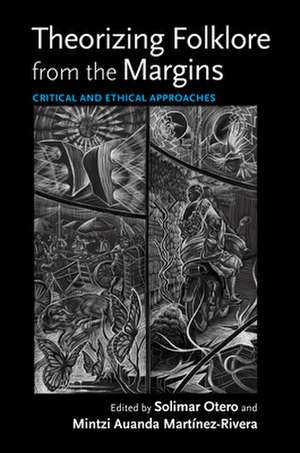Theorizing Folklore from the Margins – Critical and Ethical Approaches: Activist Encounters in Folklore and Ethnomusicology
Autor Solimar Otero, Mintzi Auanda Martínez–rivera, Rachel V. González–martin, Juan Eduardo Wolf, Miriam Melton–villanueen Limba Engleză Paperback – 14 iun 2021
The experience of living in hostile conditions for cultural, social, political, or economic reasons has redefined communities in crisis. The curated works in Theorizing Folklore from the Margins offer clear and feasible suggestions for how to ethically engage in the study of folklore with marginalized populations. By focusing on issues of critical race and ethnic studies, decolonial and anti-oppressive methodologies, and gender and sexuality studies, contributors employ with a wide variety of disciplines and theoretical approaches. In doing so, they reflect the transdisciplinary possibilities of Folklore studies.
By bridging the gap between theory and practice, Theorizing Folklore from the Margins confirms that engaging with oppressed communities is not only relevant, but necessary.
| Toate formatele și edițiile | Preț | Express |
|---|---|---|
| Paperback (1) | 217.51 lei 3-5 săpt. | +23.90 lei 4-10 zile |
| MH – Indiana University Press – 14 iun 2021 | 217.51 lei 3-5 săpt. | +23.90 lei 4-10 zile |
| Hardback (1) | 482.13 lei 6-8 săpt. | |
| MH – Indiana University Press – 14 iun 2021 | 482.13 lei 6-8 săpt. |
Preț: 217.51 lei
Nou
41.63€ • 43.30$ • 34.36£
Carte disponibilă
Livrare economică 25 martie-08 aprilie
Livrare express 08-14 martie pentru 33.89 lei
Specificații
ISBN-10: 0253056071
Pagini: 352
Ilustrații: 25 Illustrations, black and white
Dimensiuni: 155 x 232 x 24 mm
Greutate: 0.54 kg
Editura: MH – Indiana University Press
Seria Activist Encounters in Folklore and Ethnomusicology
Cuprins
Part I: Critical Paths
Introduction: How does Folklore find its voice in the 21st century? An offering/invitation from the margins
1. White Traditioning and Bruja Epistemologies: Rebuilding the House of USAmerican Folklore Studies
2. Un Tumbe Ch'ixi: Incorporating Afro-descendant Ideas into an Andean Anti-Colonial Methodology
3. Disrupting the Archive
Part II: Framing the Narrative
4. Afrolatinx Folklore and Visual Representation: Interstices and Anti-Authenticity
5. Behaving Like Relatives: Or we don't sit around and talk about politics with strangers
6. Political Protest, Ideology, and Social Criticism in Wolof Folk Poetry
7. Sugar Cane Alley: Teaching the Concept of "Group" from a Critical Folkloristics Perspective
8. movimiento armado/armed movement
Part III: Visualizing the Present
9. Ni lacras, ni lesbianas normalizadas: Trauma, matrimonio, conectividad y representación audiovisual para la comunidad lesbiana en Cuba
10. "¿Batata? ¡Batata!": Examining Puerto Rican Visual Folk Expression in Times of Adversities
11. Forming Strands and Ties in the Knotted Atlantic: Methodologies of Color and Practice of Beadwork in Lukumí Religion
12. Of Blithe Spirits: Narratives of Rebellion, Violence, and Cosmic Memory in Haitian Vodou
Part IV: Placing Community
13. "No one would believe us": An Auto-Ethnography of Conducting Fieldwork in a Conflict
14. "La Sierra Juárez en Riverside": The Inaugural Oaxacan Philharmonic Bands Audition on a university campus
15. Hidden thoughts and exposed bodies: art, everyday life, and queering Cuban masculinities
16. Complexifying Identity through Disability: Critical Folkloristic Perspectives on Being a Parent and Experiencing Illness & Disability through My Child
Index



